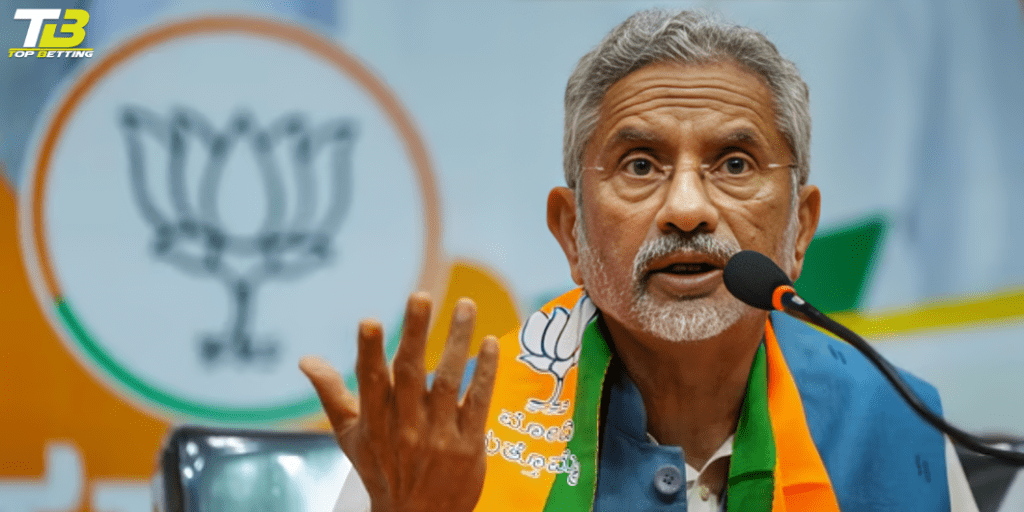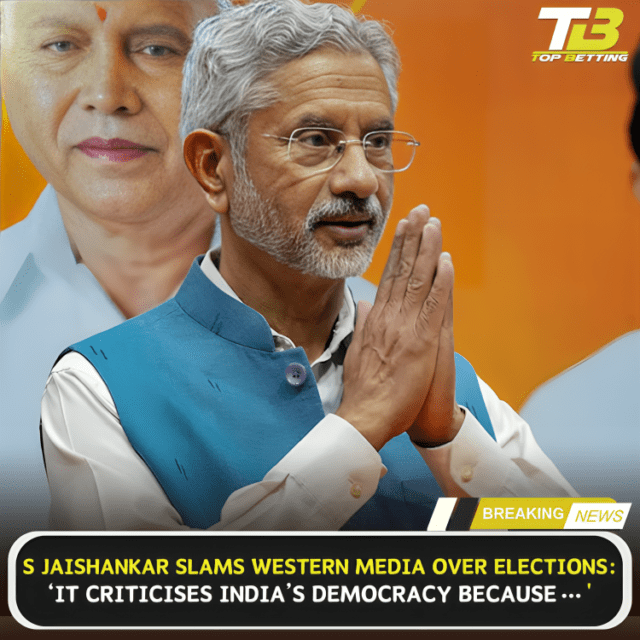
S Jaishankar slams Western media over elections
In a recent address, India’s External Affairs Minister, S. Jaishankar, criticized the Western media’s coverage of India’s elections, particularly their tendency to be overly critical of the country’s democratic processes. Jaishankar’s remarks come amid growing scrutiny from international observers regarding the state of democracy in India, especially in light of recent developments and contentious legislative changes.
With his criticism of the Western media as “political players” in India’s elections, EAM S Jaishankar took a harsh stance.
The Western media has been unfairly criticising India, according to External Affairs Minister S Jaishankar, who stated that this is not because the media lacks information but rather that Indian politicians are “political players” in the country’s elections.
S Jaishankar remarked, “I get a lot of these noises from the Western press and if they criticise our democracy, it’s not because they lack information,” during an event for nationalist intellectuals on Tuesday in Hyderabad. It’s because they believe they have a political role in our election as well.
Jaishankar mentioned a piece he had seen in a foreign media outlet that said, “Some Western media commented, ‘It’s so hot in India, why are they holding elections at this time? After reading that story, I felt compelled to comment that, for the best record, my lowest turnout was higher than your peak turnout.
“These are the games that are being played with India,” claimed Jaishankar.
Best 5 quotes from the speech by S. Jaishankar:
- “These are matters of politics.” Our domestic politics are becoming global, and the global political establishment feels compelled to encroach upon India. How can these guys determine without our input who gets to rule them?”
- “They (the West) genuinely believe they are a member of our voter base. I believe it’s time for us to disabuse them now, and confidence is the greatest way to accomplish it.
- “They will question everything, so we need to stand up to these kinds of attacks, criticisms, rankings, and reports.”
- “They’re going to question everything—your election commission, your EVM, your election system, even the weather.”
- “And one grievance is that the BJP believes it will win big and is so unfair.”
Jaishankar backs the promises made by the BJP
According to the EAM, the actions made by this government would provide India, its society, and future generations with “a very big vote of confidence” and will not only last for the next five years.
“It is the assurance; the assurance is a declaration of trust. Based on the work we have produced over the past ten years, it is an indication of confidence,” Jaishankar remarked.
“It is the combination of all of this and, as I said, the stature which the prime minister personally commands…I see that because I travel with him often,” Jaishankar said, praising Prime leader Narendra Modi.
Recalling the moment when India became the G20 chair, Jaishankar stated, “December 1, 2022, was when we got our G20 chair presidency.” Most people, I believe, said something like, “You know, I don’t know where you guys got stuck.” You are aware of how this will transpire. It’s going to be incredibly hard for you to handle this. Nevertheless, on the first day of the G20 conference, we were able to come to an agreement.
One of the key points raised by Jaishankar was the selective nature of criticism from the Western media, which tends to focus on perceived shortcomings in India’s electoral processes while overlooking similar issues in their own countries. He argued that this double standard reflects a lack of objectivity and an underlying bias against India’s democratic aspirations.
Moreover, Jaishankar criticized the tendency of some Western media outlets to amplify voices of dissent within India without providing adequate context or balance. He argued that this one-sided portrayal contributes to a distorted image of India’s democracy and undermines confidence in its institutions.
Jaishankar also addressed concerns about the influence of foreign interference in India’s electoral processes, particularly through digital platforms and social media. He emphasized the need for greater transparency and accountability in the online space to prevent manipulation and misinformation campaigns aimed at undermining the integrity of India’s democratic processes.
In response to these challenges, Jaishankar called for a more constructive dialogue between India and the international community to address common concerns and promote mutual understanding. He stressed the importance of respecting India’s sovereignty and democratic values while engaging in meaningful exchanges on issues of mutual interest.
Furthermore, Jaishankar highlighted India’s commitment to upholding democratic principles and promoting inclusive governance at home and abroad. He cited initiatives such as the International Solar Alliance and the Coalition for Disaster Resilient Infrastructure as examples of India’s efforts to foster cooperation and address global challenges through democratic means.

In conclusion, Jaishankar’s remarks underscored India’s firm commitment to democracy and its determination to overcome challenges through dialogue, cooperation, and constructive engagement with the international community. He called on the Western media to adopt a more balanced and nuanced approach to reporting on India’s elections and to recognize the country’s democratic achievements amidst its diverse and dynamic political landscape.





